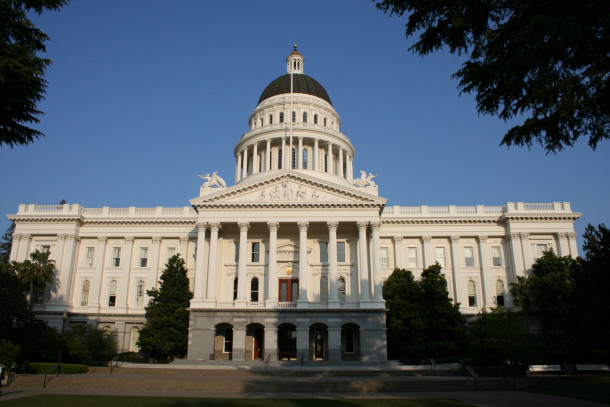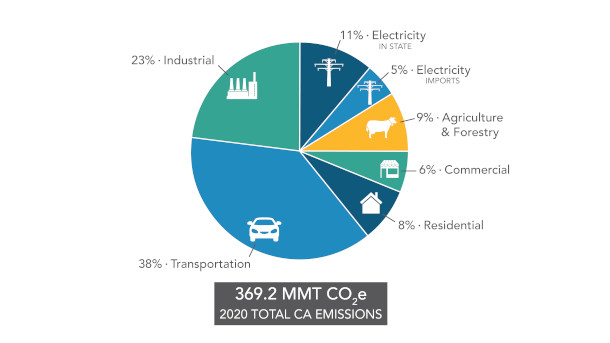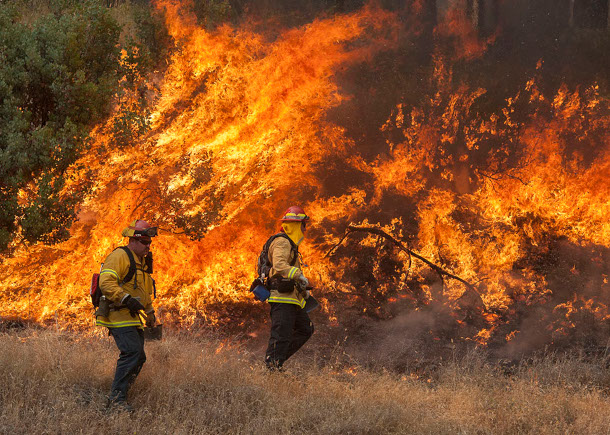California Targets Bogus Climate Offsets
Air Date: Week of July 21, 2023

The California State Capitol in Sacramento. (Photo: Pirate Rene, Flickr, CC BY-ND 2.0)
The California legislature is considering measures that would require large businesses to publicly disclose carbon emissions and verify claimed offsets. Aaron Cantu is a reporter for Capital and Main and joined Living on Earth’s Jenni Doering to give an overview of the bills and how advocates say they could help California meet its ambitious climate goals.
Transcript
CURWOOD: One of the states that’s ahead of the curve in dealing with the perils of climate change is California, where the legislature is considering measures that would require large businesses to publicly disclose carbon emissions and verify claimed offsets. A recent investigation led by The Guardian found too many offsets used by companies to claim a net-zero carbon impact are more fiction than fact. For example, the probe found 90% of the rainforest offsets certified by Verra, a carbon offset company used by Disney, Shell, and Gucci, are likely “phantom credits” that don’t equal real carbon reductions. Aaron Cantú is a reporter for Capital and Main who has been covering these bills and he spoke with Living on Earth’s Jenni Doering.
DOERING: Now I understand one of these bills in the California legislature has to do with carbon offsets, many of which have been shown to be bogus. So, how might this bill help with accountability there?
CANTÚ: Sure, so in the voluntary carbon offset market, there aren't many disclosure requirements, either for companies selling the offsets or for companies purchasing them and using them to make claims about their efforts to fight the climate crisis. So, this bill, AB 1305, would require companies either selling or buying these offsets to disclose some pretty fundamental information on their websites. You know, for example, details about the claimed carbon reduction, where, if it's planting trees, for example, where are those trees being planted, what efforts are going into ensuring that those trees aren't being destroyed or that they weren't burned up in a wildfire. The goal really is to make these offsets more credible. There was a exposé in The Guardian earlier this year, that looked specifically at one offsets verification body and found something like 90% of carbon offsets that it verifies could be problematic. So I think as far as offsets, I think just the evidence of problems has been overwhelming. And companies that don't comply with those disclosure requirements would actually face penalties from the state of California. I think the penalty is something like $5,000 a day for noncompliance. I think the penalty can't go past half a million dollars. So, this is really just a way to enforce some of these disclosure requirements, so that people can feel confident that these offsets actually really stand for something and aren't just another form of greenwashing.

California's greenhouse gas emissions in 2020 broken out by economic sector (Graphic: California Air Resources Board, public domain)
DOERING: And can you walk us through this other California bill in the Senate that would require emissions reporting?
CANTÚ: Sure, so this bill would require companies, large companies that generate over a billion dollars in revenue each year, to disclose all of their emissions across their entire supply chains, to the state of California. This information would be posted publicly, and it would be available for review to anybody who is interested. So, it would have significance for people outside of California as well. Currently, in California, some companies are required to disclose their emissions. These are companies that participate in cap and trade, but this bill would really widen the umbrella to include a lot more companies, basically large corporations. So, you can think, you know, Burger King, for example, or Walmart, Costco, these really big companies that operate in California and you know, as well as other places all over the world, would have to report all of their emissions to the state. And so, this would be valuable information for anybody living anywhere in the world, not just in California.
DOERING: And I understand that this would require Scope 1, 2 and 3 emissions to be reported. So that's direct and indirect emissions. Can you explain that a little bit and why that's important?
CANTÚ: Correct. So, Scope 1, 2 and 3 emissions, these are designations that the United Nations uses to signify different tiers of emissions for companies. And so, kind of the way to think about it is, Scope 1 includes emissions that a business emits, just in the course of its day-to-day activities, you know, if the CEO is driving to work, I mean, that technically counts as an emission. If a company has employees crisscrossing the country in jets, those count as emissions. Basically, any day-to-day activity would count as a company's emissions, that's Scope 1. Scope 2 involves the electricity used by these companies, and it's also kind of related to a business's day-to-day sort of activities. Scope 3 is a little bit different, Scope 3 includes emissions from fuels and other carbon-based products that are burned by consumers, that result in emissions into the atmosphere. And so Scope 3 is especially relevant for oil and gas companies, for example. So, you think about, you know, Chevron is selling gasoline, or jet fuel, so when people burn that fuel that they purchased from Chevron, for example, these would count as Chevron Scope 3 emissions, and Scope 3 emissions actually account for the vast majority of emissions in the atmosphere. And so, that's what's particularly important about this bill, is that it would require these Scope 3 emissions to be reported as well.

According to the National Interagency Fire Center, California leads the country with the most wildfires and number of acres burned. California-specific charts below on the Top 10 largest, most destructive, and deadliest wildfires. (Photo: Cal Fire, Flickr, CC BY NC 2.0)
DOERING: Yeah, I think another example of Scope 3 emissions would be if I go out and you know, it's really hot out right now, I buy a window AC unit, and Scope 3 includes the energy that my air conditioner consumes when I'm running it. So, you can see how, that's a lot of energy, and then there's also, if you factor in the coolant leaking out over time, those are pretty significant emissions.
CANTÚ: Right, exactly. So that's probably the most significant part of this bill, is that it would require those emissions to be reported as well. You know, obviously, companies aren't super happy about that, but those kinds of disclosures and that kind of information is really essential for us to understand what the impact of these companies is on the atmosphere and the contributions they're making to the climate crisis.
DOERING: Now, I can imagine there are companies that are not all that happy about these bills, I mean, to be told the emperor has no clothes and these offsets that you say are real are bogus, you know, that's a little painful for them to swallow. So, how are they responding? What opposition have these bills faced?
CANTÚ: Sure, so the emissions disclosure bill has faced opposition from the California Chamber of Commerce, a very powerful association, obviously, in California as well as in the U.S. Their primary complaint has been that these disclosure requirements would be onerous. One thing that they like to cite is for larger companies that have, you know, contractors and subcontractors within their supply chains, it would be difficult for those smaller contractors to report their emissions. They attempted to pass this bill last year, and that was a complaint that the Chamber of Commerce had, and they've repeated that criticism this year. And for the offset bill, the primary opposition has been the oil and gas industry, the Western States Petroleum Association, which is the largest oil lobbying association in California and the western United States. And the basic complaint that they've had is that this bill creates repetitive and redundant disclosure requirements. I think a key difference is that the California bill, if it becomes law, would impose penalties on companies that do not disclose this essential information. So,whereas right now, it's voluntary, the bill would make it mandatory, and so, yeah, lots of opposition to both of these bills.

According to research led by the Guardian, only six percent of the company Verra’s deforestation credits represented real emissions reductions. Verra is considered the world's leading carbon standard maker for the offsets market and a major source of rainforest offset credits used in the carbon market. (Photo: Axel Fassio, Flickr, CIFOR, CC BY ND 2.0)
DOERING: Now, California is one of the leading states when it comes to setting climate policy, and Governor Gavin Newsom, along with other California legislators, committed to achieving carbon neutrality no later than 2045 and 90% clean energy by 2035. So, where do these two bills on emissions disclosure and carbon offsets fall in the state's climate ambitions?
CANTÚ: Well, if bills were to pass, it would help California reclaim its mantle as a leader on fighting the climate crisis. California has imposed its own deadlines and its own goals for cutting emissions within the state. And other ways, California has led in the past, programs such as cap and trade or the low-carbon fuel standard, another program that was pioneered in California to eventually get fossil fuels out of transportation fuels. These were ideas that California innovated, you know, about 10 or 15 years ago. In recent years, however, other states, other regions, and other countries across the world have also implemented innovative solutions and policies when it comes to fighting the climate crisis, and so, there's been discussion around the fact that, you know, California in some ways isn't really the leader in this space anymore. And that has been the result of the power of the oil and gas lobby in Sacramento, as well as associated business interests. So, I think California really has a lot at stake here. If it doesn't pass these bills, then I don't think California can credibly claim to be the leader in fighting climate change that it likes to present itself as.
CURWOOD: That’s reporter Aaron Cantú from Capital and Main, speaking with Living on Earth’s Jenni Doering.
Links
Capital and Main | “Oil and Gas Lobbying Threatens California’s Game-Changing Climate Bills”
Grist | “A California Bill Could Reveal Corporate America’s Climate Secrets”
JDSUPRA | “California Senate Passes Broad GHG Emissions Reporting Requirements”
Living on Earth wants to hear from you!
Living on Earth
62 Calef Highway, Suite 212
Lee, NH 03861
Telephone: 617-287-4121
E-mail: comments@loe.org
Newsletter [Click here]
Donate to Living on Earth!
Living on Earth is an independent media program and relies entirely on contributions from listeners and institutions supporting public service. Please donate now to preserve an independent environmental voice.
NewsletterLiving on Earth offers a weekly delivery of the show's rundown to your mailbox. Sign up for our newsletter today!
 Sailors For The Sea: Be the change you want to sea.
Sailors For The Sea: Be the change you want to sea.
 The Grantham Foundation for the Protection of the Environment: Committed to protecting and improving the health of the global environment.
The Grantham Foundation for the Protection of the Environment: Committed to protecting and improving the health of the global environment.
 Contribute to Living on Earth and receive, as our gift to you, an archival print of one of Mark Seth Lender's extraordinary wildlife photographs. Follow the link to see Mark's current collection of photographs.
Contribute to Living on Earth and receive, as our gift to you, an archival print of one of Mark Seth Lender's extraordinary wildlife photographs. Follow the link to see Mark's current collection of photographs.
 Buy a signed copy of Mark Seth Lender's book Smeagull the Seagull & support Living on Earth
Buy a signed copy of Mark Seth Lender's book Smeagull the Seagull & support Living on Earth

